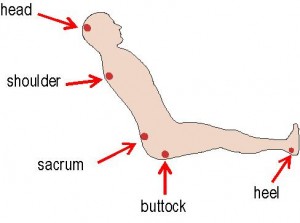As nursing home abuse lawyers, we have previously posted educational tips about the prevention and treatment of bed sores. Today we wanted to inform readers of some additional forms of nursing home abuse that often occur. Just as with bed sore prevention, there are signs that can be observed that indicate nursing home abuse.
Physical Abuse in Nursing Homes
One type of nursing home abuse that has outward signs is physical abuse. Physical abuse is occuring if bodily injury or pain results from the excessive application of physical force. The abuse can be, but is not limited to: hitting, pushing, shoving, pinching, burning, or even beating. Inappropriate use of restraints is another form of physical abuse. In fact, the use of restraints over long periods of time is not only physically abusive, but can also lead to the development of bed sores and pressure ulcers. The over use of medications, usually sedatives, and force feeding can also be considered physical abuse.
Nursing Home Abuse Red Flags
 It is important that nursing home staff be fully trained in how to deal with the special needs of nursing home patients so that physical abuse does not occur. It is also important that a patient’s family be aware of the signs of abuse. Some of the more obvious signs are bruising, cuts, unexplained marks, broken bones, and a variety of injuries in various stages of healing. It is also important to listen to the patient. A resident’s report of violent behavior, such as being hit or mistreated, must be investigated. Sometimes, a nursing home patient’s sudden change in behavior can be a sign of nursing home abuse or neglect and should absolutely be investigated. Any drastic changes with no explanation must be looked into.
It is important that nursing home staff be fully trained in how to deal with the special needs of nursing home patients so that physical abuse does not occur. It is also important that a patient’s family be aware of the signs of abuse. Some of the more obvious signs are bruising, cuts, unexplained marks, broken bones, and a variety of injuries in various stages of healing. It is also important to listen to the patient. A resident’s report of violent behavior, such as being hit or mistreated, must be investigated. Sometimes, a nursing home patient’s sudden change in behavior can be a sign of nursing home abuse or neglect and should absolutely be investigated. Any drastic changes with no explanation must be looked into.
Sometimes, nursing home staff will actually try to hide signs of abuse by refusing access to the patient by visitors. This can cause residents to not only suffer from isolation, but also become fearful of discussing the abuse or neglect with a family member or supervisor. Any refusal by nursing home staff to allow visitor access should raise immediate red flags that are probed with the utmost scrutiny. As in all cases of nursing home abuse, the sooner it is discovered, the sooner the treatment and prevention of further abuse can take place. It is imperative to watch for the signs of physical abuse, especially in those nursing home patients that are unable to protect themselves.
Nursing Home Abuse Lawyers in NJ and PA
If your loved one is a resident at a nursing home or long term care facility, and you believe they are receiving inadequate and negligent care, contact the Mininno Law Office for a free case evaluation. You may also call for a free consultation at (856) 833-0600 in New Jersey, or (215) 567-2380 in Philadelphia.
Let the team at the Mininno Law Office work to earn you the full and fair compensation you need and deserve.
 Bed sores result from prolonged pressure that prevents proper blood flow to tissues, which, in turn, kills that tissue. The death of this tissue most often occurs when it is compressed between a bony prominence and an external surface, i.e. bed, wheelchair, or sometimes even other parts of the body. Some of the worst bed sores that occur in nursing home patients don’t even occur from those that are bed ridden as the name suggests. Prolonged sitting in a wheelchair can lead to bed sore development. It is important that nursing home staff members are equally vigilant with their nursing home patients in wheelchairs and in beds.
Bed sores result from prolonged pressure that prevents proper blood flow to tissues, which, in turn, kills that tissue. The death of this tissue most often occurs when it is compressed between a bony prominence and an external surface, i.e. bed, wheelchair, or sometimes even other parts of the body. Some of the worst bed sores that occur in nursing home patients don’t even occur from those that are bed ridden as the name suggests. Prolonged sitting in a wheelchair can lead to bed sore development. It is important that nursing home staff members are equally vigilant with their nursing home patients in wheelchairs and in beds.